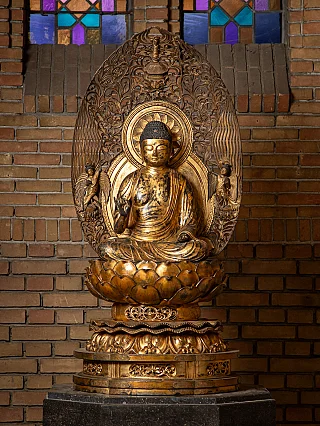Pure Land Buddhism: Origins and Beliefs
Author : Peter Vredeveld

Pure Land Buddhism is a prominent Buddhist tradition in China, Japan, Korea, Taiwan, and Vietnam. Most Pure Land Buddhist sutras and teachings are based on Amitabha Buddha.
Pure Land Buddhism is one of East Asia's most widely practiced Buddhist traditions. Pure Land Buddhism is believed to be an early branch of Mahayana Buddhism. In the Pure Land tradition, most Buddha teachings are primarily based on Amitabha or Amida Buddha. Many names know Pure Land according to the country's culture and beliefs, but it is globally known as Amidism. Pure Land is the largest Buddhist school in China and East Asia.
History of Pure Land Buddhism
It is believed that Pure Land Buddhism originated in India, and some think that Pure Land originated in Kashmir and central Asia. The early sutras of Pure Land Buddhism were believed to be written in the Gandhara language, which is supposed to be related to Sanskrit. Some images showed Amitabha Buddha with Bodhisattva Avalokitesvara and Bodhisattva Mahasthaprapta, among the top eight Bodhisattvas. In early Pure Land Buddhist tradition, Pure Land Buddhist texts and practices were spread by Mahayana Buddhist teachings, including Nagarjuna and Vasuvandu.

Pure Land Buddhism was first introduced to China in early 147 CE when Kushan Buddhist monks Lokaksema started translating original Pure Land Buddhist sutras into Chinese. However, pure land Buddhism became prominent only three centuries after Donglin Temple's foundation at Mount Lu in 402 CE. The Pure Land Teachings and practices quickly spread all over China. Monastic thinkers like Huiyuan, Tanluan, Daochuo, Shandao, and many other elite Buddhist thinkers and monks systemized them. Around the 10th century, a Buddhist monk named Honen Shonin introduced Pure Land Buddhism in Japan. Pure Land teachings were spread to Japan, gradually becoming more prominent in Genshin and Fujiwara no Michinaga and other cities of Japan. Pure Land Buddhism has established a sect known as Jodo Shu in Japan and has become a prominent Buddhist tradition in China, Japan, Korea, Taiwan, and Vietnam.
Amitabha Buddha in Pure Land Buddhism
Namo Amitabha Buddha is one of the most taught recitations in Pure Land Buddhism, and this phrase is even known to non-Buddhist Dharma learners, even though they do not possess the doctrines of Pure Land Buddhism. Many Buddhas have existed in the history of humanity, and many need clarification about who Amitabha Buddha is. According to Pure Land:
- Amitabha Buddha is the one who has fulfilled his Fundamental Vow.
- Amitabha Buddha is the one who vowed to deliver sentient beings from pain and suffering.
- Amitabha Buddha is the one who graces the reciters of his name with his light.
- Amitabha Buddha is the one who receives Reciters when they die.
One of the main reasons that Amitabha is "Namo Amitabha Buddha" is that he is the one who fulfilled his fundamental vow. Even though all existing Buddhas have their fundamental vow, the fundamental view that Amitabha Buddha took was different. It is believed that every Buddha (the past and future) must undertake the Four Great Vows to attain Buddhahood. Amitabha Buddha undertook transcendent vows believed to surpass all the Great Four vows.
"Amitabha Buddha's vows exceed all"- Shakyamuni Buddha
In Pure Land Buddhism, it is believed that upon reciting the chant of Amitabha Buddha, Amitabha Buddha protects the reciter day and night and doesn't let any enemies approach the reciter. And when they die, they are reborn in Pure Land as a matter of course. Even though the reciters are saints or ordinary, whether they know or don't know how to practice dharma, as long as they recite the name of Amitabha Buddha with resolve, they are reborn in Pure Land.
"Uninvited, He becomes a friend to multitudes of beings and shoulders their heavy karmic burdens"- Amitabha Sutra
It means that Amitabha Buddha doesn't need to be invited or asked; as long as the reciters chant his name, he redeems all the karmic hindrances.
Share this page



















